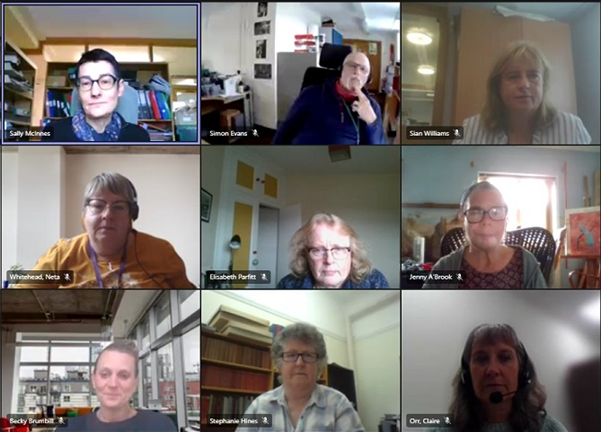Sally McInnes is Chair of the Archives and Records Management Digital Preservation Group at the National Library of Wales
In Wales, we have been working for many years to break down barriers to digital preservation through working collaboratively to increase capacity and skills. The publication of the National Digital Preservation Policy and accompanying Technical Appendix, on Digital Preservation Day in 2017, aimed at ensuring digital resources of enduring value would be selected for preservation and remain authentic and accessible in the future and to raise awareness of the importance of digital preservation for stakeholders and decision makers. The policy framework is supported by the development of a technical solution, which links Archivematica, Fedora and the National Library of Wales’s Digital Archive, whilst providing access to content through the discovery systems which are managed by the partners.
In 2020-21, funding was received from the Welsh Government’s Local Government Digital Transformation Fund to undertake a project to consider the issues arising from the management of records held within systems where the operational life of the system is considerably less than the life span of the records to be managed. The research, which was undertaken by KevinJBolton Ltd, concluded that whilst Archivematica offered some technical solutions, the lack of recognition of the need for digital preservation and resource constraints were inhibiting progress and that advocacy, increasing capacity and resources remained critical issues. The report put forward a number of recommendations to address areas, including developing practical digital preservation work, increasing skills and confidence through using existing resources to develop simple workflows and processes for collecting and preserving digital data, as well as promoting the use of the Archivematica solution.
In response to these recommendations, the Saving the Bits training sessions were launched in June 2021. The sessions were designed to introduce digital preservation concepts and to assist with developing workflows and processes. These processes were demonstrated through using both Archivematica, with its built in tools and through a manual workflow based on a Windows 10 operating system, installed with tools with user-friendly GUIs, such as AVG, Antivirus, Teracopy, AVP Fixity, Droid and Jhove.
The comparison of the manual and Archivematica workflows revealed some interesting results, such as the Iffy Tiff. A test collection, comprising pdfs, doc, rtf files and one Tiff, was selected to demonstrate how file identification and authenticity could be performed through the manual solution and through Archivematica. The files were run through Droid and Jhove and were considered well formed in the manual workflow, but the single Tiff failed the Identify File Format microservice in Archivematica, which uses the tool Siegfried for identification. This tool, based on PRONOM, does not differentiate between versions of Tiff, but NLW standards require a format version, so we have modified Archivematica to run the command-line version of Jhove over such files to discover the format version. In this case Jhove found no format version so identification failed. The identification passed in the manual version as, although Jhove could not identify the file as a Tiff, it relied on using the bytestream module for validation which it passed. A visual inspection of this Iffy Tiff revealed that it was a scan of a paper document, which had not been generated with the correct format specifications, but looked fine and was readable in the present, but would be at risk for future access, if it was left Iffy!
The sessions, attended by archives service staff and colleagues from other heritage sector organisations across Wales, have raised awareness of digital preservation through practical sessions, supported by videos which explain the processes. The documentation and demonstration videos from these sessions are available for all on the Archives Wales website. The sessions demonstrate that breaking down barriers to digital preservation relies on working collaboratively, sharing knowledge and skills and giving it a go.

Teaming up to Save the Bits in Wales.
